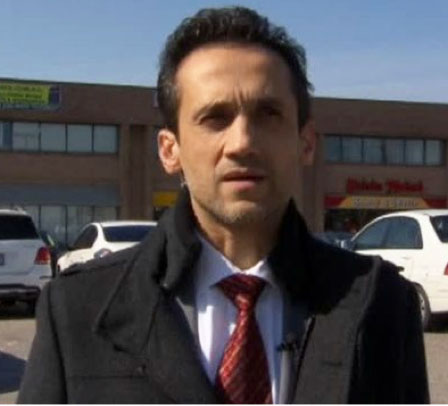
After initially detaining an Ajax, Ont., man under suspicion he might commit a terrorist act, the RCMP has charged him with a terror-related offence.
 Kevin Omar Mohamed, 23, was in Brampton Court Tuesday. He was initially arrested last Friday under a controversial law — preventive detention under the Fear of Terrorism Offence section of Bill C-51.
Kevin Omar Mohamed, 23, was in Brampton Court Tuesday. He was initially arrested last Friday under a controversial law — preventive detention under the Fear of Terrorism Offence section of Bill C-51.
According to The Canadian Press, police charged him first with two minor weapons offences related to a hunting knife, but have now also charged him with participation in a terrorist group.
Mohamed's lawyer, Anser Farooq, said Mohamed’s arrest was triggered on the basis of allegations that his client was planning to go overseas to pursue terrorism, though he noted his client had not been charged with this. He did not say who made the allegations.
Farooq said it was not clear what the RCMP believed Mohamed was planning.
The initial arrest on “preventive” measures could give Mohamed’s lawyers grounds for a challenge, says one criminal defence and constitutional lawyer.
“Given he was originally apprehended under preventive detention or subject to a peace bond, I would be surprised if his counsel did not mount a constitutional challenge to those provisions,” says Annamaria Enenajor, a lawyer with Ruby & Shiller Barristers in Toronto.
“I think when they were being passed, or in the discussions surrounding them as well as afterwards a lot of issues with respect to their potential breach of Charter rights was flagged and I think those issues still stand.”
Enenajor says preventive detention lowers the threshold for preventive arrest and detention and allows someone to be detained on the mere suspicion they are involved in a terrorist activity.
“I think that would attract the scrutiny of s. 7 of the Charter. So would the use of the peace bonds under 810.011 [of the Criminal Code] — based on the fear a person may commit an offence related to terrorism,” she says. “There is a lot of ambiguity and vagueness around the legal definition of what is terrorism.”
She adds there is also the “over-breadth of the legislation” and the onerous restrictions imposed on a person subject to the peace bond including surrendering their passport and being subject to requirements to remain in a specific geographic location.
“I think that is quite onerous now that the standard has changed from ‘likely’ or ‘will’ carry out a terrorist offence to ‘may.’ I think there is space there for the courts to see if that would pass constitutional muster — the way the threshold has been redefined by C-51,” she says.
While the Canadian Civil Liberties Association and others have called for an end to aspects of C-51 including preventive detention, the CCLA says in this case things did move quickly to actual charges.
“We’ve been very vocal about the preventive detention provisions, but from what I can glean the story here is evolving,” says Sukanya Pillay, the CCLA’s executive director. “He has now been charged with the weapons charge as well as belonging to a terrorist group. They are specific charges under the Criminal Code so now the preventive detention no longer applies.”
Mohamed was remanded to a bail hearing April 19, which is expected to potentially be three days long.
“I won’t be surprised if he doesn’t get bail,” says Pillay. “This seems to be a situation where the law is taking its course. We have to wait to see how it plays out and what evidence is being brought against him.”
Given recent terror attacks in Brussels, Enenajor says it will be difficult for the government to tackle elements of C-51.
“The public is more likely to be scared and be persuaded by arguments based on fear, but I think any government has to be brave in situations like this and recognize preventive detention is really at odds with our legal tradition of only prosecuting and punishing crimes that have already been committed,” she says. “In these times of great distress and fear our government has to be brave and attune to these Constitutional principles because it’s during these times they come under greatest attack.”
With files from Reuters.